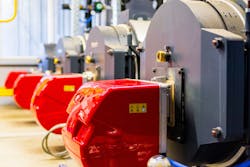Cortec Releases ‘Survival Guide’ for Extended Shutdown of Commercial, Institutional Facilities
St. Paul, MN — As the reopening of some commercial and institutional facilities gives a glimmer of hope for more normal days ahead, other facilities remain closed and uncertain on when or if they will open again. Over the last several months, these hotels, resorts, restaurants, theme parks, convention centers, school districts, university campuses, and air and ship terminals have faced new challenges as unprecedented public safety measures have reduced or shut down operations completely. Many facility managers who never had to even consider a preservation plan have been left with a major project to tackle. Among other tasks, corrosion prevention on core utilities such as boilers, cooling water systems, and closed loops is a top priority, since corrosion on idle equipment can result in:
• Premature equipment failure
• Unnecessary and non-budgeted repair/replacement costs
• Further delays to equipment startups
To help commercial and institutional facility managers avoid these negative repercussions, Cortec® Corporation has released a detailed white paper on simple and effective strategies for the layup of boilers, closed loops, and cooling water systems at commercial and institutional facilities. These strategies provide excellent protection with minimal effort and easy startup. Helpful reference charts identify the best water treatments to apply based on system type, component, size, and dry or wet-dry layup method. The guide offers invaluable direction for those still in the middle of a shutdown crisis, as well as for those who are reopening but can still benefit from corrosion solutions for temporary preservation of boilers or cooling systems entering seasonal layup.
The white paper also includes solutions for cleaning; odor control; and drain, septic, and grease trap maintenance using biologicals from Cortec’s biotechnology subsidiary, Bionetix® International. These products contain beneficial microorganisms that continue biodegrading waste and soils even after initial application. This ongoing biological activity makes shutdown an ideal time for treatment because it gives the microorganisms plenty of opportunity to work without disruption while drains are not being used.
Shutdown is also an excellent time to perform concrete repair and maintenance tasks without getting in the way of customers, tourists, or students who would normally be on site. To maximize the durability of these projects and structural components, the white paper identifies several MCI® materials to mitigate corrosion: MCI® repair mortar, surface applied Migrating Corrosion Inhibitors (with or without a combination water repellent), and a water-based coating to protect rebar from corrosion in outdoor storage.
It is easy to guess that the need for simple, effective protection of basic utilities has reached an all-time high this year. Fortunately, this white paper gives facility managers an excellent preservation plan to guide them through a time of uncertainty toward the hope of a good future startup—minus the problems of corrosion.
Read the new white paper on “Protecting Commercial and Institutional Facilities During Extended Shutdowns” here: https://www.cortecvci.com/protecting-commercial-and-institutional-facilitiesduring-extended-shutdowns/
About Cortec® Corporation
Cortec® Corporation is the global leader in innovative, environmentally responsible VpCI® and MCI® corrosion control technologies for packaging, metalworking, construction, electronics, water treatment, oil & gas, and other industries. Our relentless dedication to sustainability, quality, service, and support is unmatched in the industry. Headquartered in St. Paul, Minnesota, Cortec® manufactures over 400 products distributed worldwide. ISO 9001, ISO 14001:2004, & ISO 17025 Certified. Learn more: http://www.cortecvci.com
